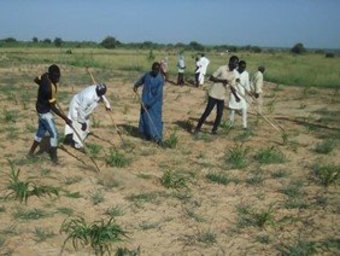Forecast-based financing for drought in Niger
Niger is one of the most drought-prone countries in the world, and this represents a major threat to much of its population. Nearly 80 percent of Nigeriens are dependent on agriculture and pastoralism, and drought conditions – especially water scarcity during crucial stages of the growing season – lead to low agricultural and livestock productivity, crop damage and reduced yields. Combined, these result in food and nutritional insecurity, with people going hungry for a period of up to five months. The frequent occurrence of these shocks exacerbates the problem.
To enhance communities’ resilience to drought, and to increase their food and nutritional security, the Niger Red Cross is implementing forecast-based financing for droughts in the Zinder region. This is part of a project to enhance community resilience to food insecurity. The project, which started in 2019, is being run in partnership with the French Red Cross, with technical support from the Red Cross and Red Crescent Climate Centre. Other project activities include strengthening the country’s early warning system, training the National Disaster Response team, and developing drought contingency plans.
Video
Drought Forecast based Financing
This video explains how forecast-based financing works in practice, using drought in Niger as an example.
Play Video
Vidéo
Drought Forecast based Financing (version française)
Watch the video on FbF for drought in French here/ Lien vers la vidéo du FbF-Secheresse en français
Play Video
“The goal of forecast-based financing is … to anticipate disasters and reduce their impacts, consequently promoting community resilience.”
The Drought Early Action Protocol
A significant early milestone for the project was the validation of its Forecast-based Financing Drought Early Action Protocol in July 2021. This was achieved through continued collaboration between the project partners, as well as with the IFRC Livelihoods Centre.
Drought is a slow onset disaster; it can take several weeks or months for its impacts to be felt. To account for this, the Drought Early Action Protocol for Niger includes specific early actions associated with two key phases: (1) A bad rainy season, leading to low agricultural production and below-average harvests; and (2) a food and nutritional crisis due to low agricultural production and poor harvests.
Several triggers were identified for the protocol (these are explained in more detail in the video):
- For the rainy season:
- ‘Lower than normal’ rainfall, as indicated by the April weather forecast
- For food and nutritional security:
- The rate of food insecurity reported in November, with a trigger threshold of ‘crisis phase’
- The synthesis of production conditions, with a trigger threshold of ‘poor and/or below’
- The report of the previous rainy season will also be studied, with a trigger threshold of ‘a level 50% below of anomaly in relation to the historical average’
If reached, these triggers will (in November each year) lead to the following early actions:
- In anticipation of low agricultural production:
- Distribute seeds adapted to drought and with short growth cycles, which will provide at least a minimum crop yield
- In anticipation of a food and nutritional crisis:
- Replenish cereal banks, so produce can be sold at subsidised prices and in sufficient quantities
- Distribute vouchers to allow the poorest households to access subsidised cereals free of charge, and build up food reserves
The protocol targets 4,000 households in the agropastoral livelihood zone of Zinder, with CHF 350,000 (approx. EUR 323,000) dedicated to delivering these early actions.
Next steps
The next challenge for the Niger Red Cross is to scale up these activities to further regions in Niger. This will be done alongside with its current project partners, and in collaboration with the British Red Cross.
Find out more
For more information about the project, please contact rrc-zinder.frc [AT] croix-rouge.fr



